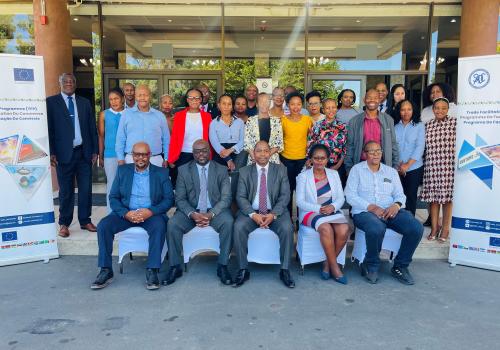The Kingdom of Lesotho validated the draft Coordinated Border Management (CBM) National Strategy which is geared at enhancing border efficiency by eliminating redundancies, duplications, and delays without compromising controls, safety and security in Maseru, Lesotho between 26 - 27 February 2024.
The Southern African Development Community (SADC) Secretariat, through the European Union (EU) funded SADC Trade Facilitation Programme (TFP) provided technical assistance to the Kingdom of Lesotho in developing the draft CBM.
In his official remarks, Mr Alcides Monteiro, Senior Programme Officer - Customs at the SADC Secretariat, noted that the Kingdom of Lesotho joins the Republic of South Africa, Malawi, Mozambique, Namibia, Botswana, and Zambia in the implementation of the CBM concept and congratulated Lesotho for complying with the measures of the CBM.
The development and implementation of a CBM National Strategy assists Member States in meeting their obligations under the SADC Protocol on Trade, World Customs Organisation Revised Kyoto Convention, and the World Trade Organisation (WTO) Trade Facilitation Agreement (TFA). The instruments call for the implementation of measures to promote economic growth through improved regional and global trade facilitation.
The Chairperson of the National Trade Facilitation Committee (NTFC), Ms Malineo Seboholi, highlighted that trade facilitation is central to Lesotho's achievement of developmental aspirations as a landlocked country.
She further noted that CBM is identified as a key enabler for effective and efficient cross border control in the Kingdom of Lesotho’s National Trade Facilitation Roadmap and will guide the country in accelerating delivery of seamless trade to the private sector.
CBM endeavours to streamline border operations by sequencing border activities in a harmonised, predictable, and simplified manner.
The workshop was attended by Government ministries, departments, and agencies, as well as private sector organisations, that play a role in the cross-border movement of people, goods and the means of transport.
Stakeholders participated in reviewing the draft CBM Strategy by critically evaluating the current status, requirements, assumptions and constraints for implementing CBM in the country.
The objectives of the workshop were to evaluate gaps in the draft CBM National Strategy and provide recommendations, enhance capacity of participants on CBM domestication, implementation and ownership, and secure high-level political support and involvement of management from key ministries, departments and agencies involved in border management in Lesotho towards implementation of the CBM concept.
The workshop concluded that there was need to develop a border management policy to facilitate the implementation of CBM, formalise the appointment of a lead agency to coordinate CBM implementation activities in Lesotho, maintain statistics on border operations in order to inform management and policy decisions on the implementation of CBM and general border operations, and for Government to mobilise financial resources, develop a budget with an implementation plan for CBM activities.

